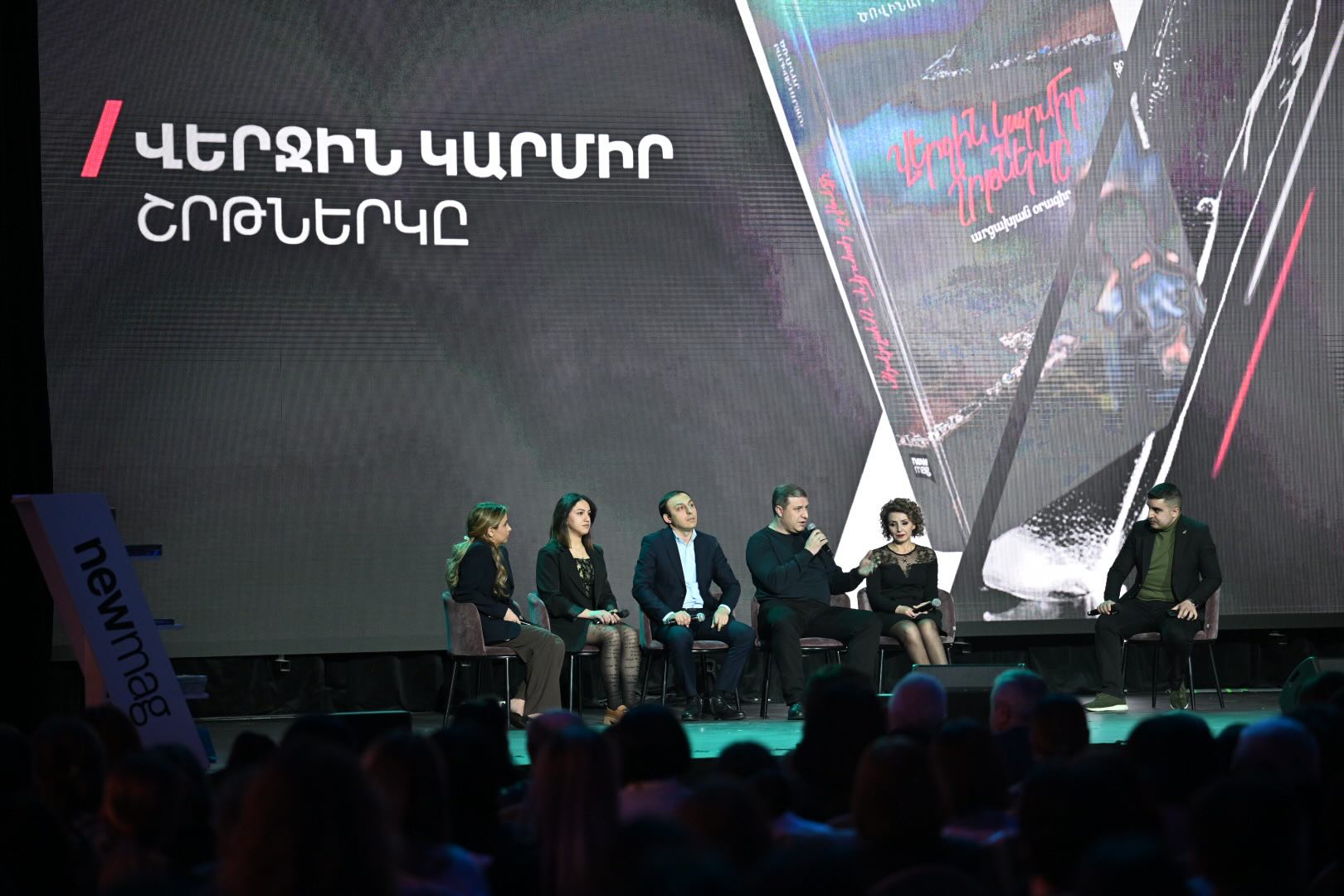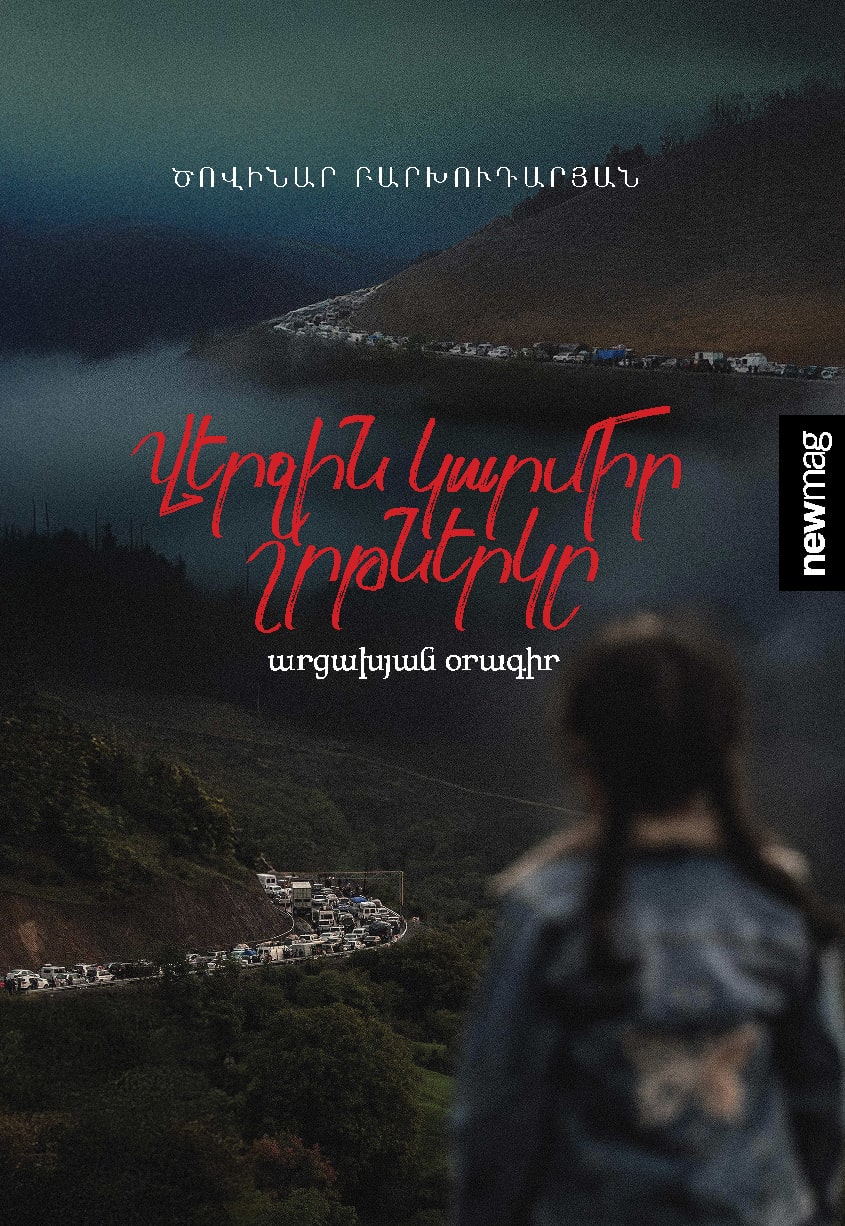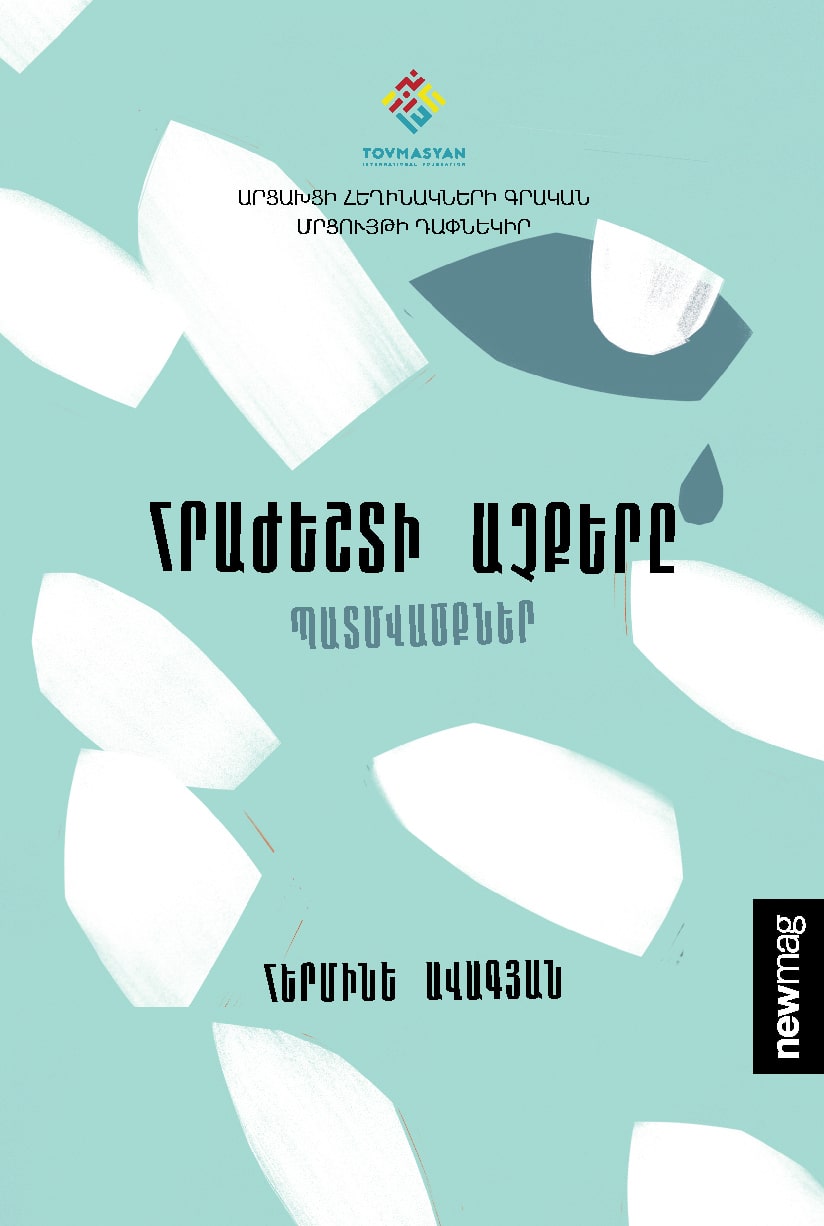Echoes of Artsakh at Newmag Winter Book Fest
02/20/2025

At the Newmag Winter Book Fest 2025, held on February 16 in Yerevan, Armenia, two significant voices from Artsakh shared stories of loss, resilience and hope, offering profound insight into the experiences of Armenians from Artsakh.
Hermine Avagyan presented her book Farewell Eyes, a collection of moving short stories. Tsovinar Barkhudaryan introduced The Last Red Lipstick, a heartfelt account of war and displacement.
“The night ran through the village streets with stars on its shoulders, fell into puddles and emerged again. It fell once more and came out again. It left behind some stars in the puddles, some memories, some dreams, whose ownership it did not know, and when they had remained on the stars. The night passed through all the houses, entered through all the windows, counted, counted again. The houses were in place, but the people were not. All doors were closed.
I wonder, when was the last time peace passed through these parts? Perhaps it wandered through the houses to warm its feet by the stoves, but it was cold inside. Maybe peace always comes from strange places.”
These lines, translated from Avagyan’s Farewell Eyes, reflect the themes of displacement and longing that define the Artsakh Armenian identity. Both books were published by Newmag through the Artsakh Writers Competition, supported by the Tovmasyan Foundation and the Amrots Foundation, underscoring their commitment to preserving Artsakh Armenian voices. The goal of this competition is to ensure that these writers do not become diluted within the broader Armenian literary landscape but retain their unique Artsakh identity.
“For the Amrots National Development Foundation, this book stands as a sincere testament to the struggle and unwavering resistance for the homeland. It speaks to the losses, strength and dignity of its people, inviting the reader to empathize deeply. We are proud to sponsor this publication, confident that it will convey the indomitable spirit of the Artsakh people, touch the hearts of readers and inspire a renewed sense of hope,” Amrots Foundation announced upon the book’s publication.
Born in the village of Ashan, in Artsakh’s Martuni region, Avagyan is a seasoned journalist with four books to her name, and has been recognized with literary awards across Armenia, Artsakh and the Armenian diaspora. Farewell Eyes explores the loss of homeland and the unwavering hope for reunion. Avagyan initially hesitated to participate in the competition due to the book’s sensitive nature, having written many of the stories during Azerbaijan’s blockade of Artsakh.
However, speaking at the book presentation, she said, “We must constantly talk about Artsakh. Everyone must try to raise the voice of the Artsakh people on every possible platform. My voice is literature, and I must make my voice heard, which is also the voice of Artsakh’s survival. The more we talk about Artsakh, the more that great dream that we all carry within us will live.”
She articulated her belief in the transformative power of art, stating, “The pain of war is immense, and we must heal and show the great evil of war through creation. Perhaps by reading these stories, humanity will be closer to overcoming that pain.”
In Farewell Eyes, readers encounter characters who have lived through multiple wars, witnessed forced displacement and death, and bear the deep wounds of conflict. They grapple with silent pain and an unending yearning for their abandoned homeland. Despite their trials, these characters are united by a shared belief in peace and the hope of returning home.
For Avagyan, writing the collection was challenging, marked by feelings of guilt and emptiness. She remained in Yerevan during the blockade while the Hakari Bridge was blocked. “On the other side was not only territory and people, but a great spiritual world, my childhood and adolescence, my dreams, and the victory created by my father and many other Armenian sons,” she said. She drew inspiration from the fact that Artsakh’s Armenians read her works amid unimaginable deprivation, seeking spiritual nourishment.
The author describes feeling split in two, with a part of her – “that Hermine who remained on the other side of the bridge” – fueling her creative process. She hopes that, one day, these two selves will reunite in Artsakh.
At the presentation of Farewell Eyes, poet, literary critic and translator Nerses Atabekyan remarked on Avagyan’s duality as a prose writer and poet. He described her collection as a “call to action against genocide,” emphasizing that it conveys not just the pain that often clouds our consciousness, but a drive to action.
“Literature does not impose; rather, it shapes thought. It is a mirror through which we see ourselves. If we wish to see victims, we will see victims; if we want to envision an Artsakh that is yet to come, then that is what we will have. Avagyan’s literature speaks of that future,” Atabekyan said.
During the festival, another significant work was presented: The Last Red Lipstick by Tsovinar Barkhudaryan. This book is a living testament to the heroic resistance of Artsakh, rich with real facts, deep emotions and unwavering will. In the year following the forced displacement of the entire Armenian population Artsakh, Barkhudaryan collected numerous testimonies—shocking, painful, terrifying and deeply moving accounts that inspire strength to live.
In this single volume, she narrates the stories of 12 women from Artsakh with incredible dignity. Barkhudaryan shares her own story alongside those of her fellow Artsakh residents, illustrating the indomitable spirit of the Artsakh people and the harrowing journey of forced displacement.
“In war, the hardest thing was applying red lipstick. There were only a few minutes left before going live on air, and I noticed that I had nothing but red lipstick. I put it on and went on air to read the names of the first fallen. The most brutal thing in the war was reading the names of the dead with red lipstick, searching for your husband’s name in those lists. Every day, for 44 days, the lists were very long. At first, my eyes would smudge, but then, I realized it was pointless; by the time I reached my lipstick, my results were erased. Only my red lipstick remained, the only color I had, the only color that dominated that war. I would breathe a sigh of relief when there wasn’t a familiar surname, and in the next moment, my soul would be weighed down by shame. There were hundreds of others’ husbands, children, fathers, brothers and relatives in the lists.”
These words reveal the significance of the title, The Last Red Lipstick. The book is a testament to three wars—containing scenes from the first Artsakh war in the 1990s, the 44-Day War in 2020 and the one-day war in September 2023—as well as the forced displacement and heroic resistance.
Addressing the audience at the Newmag festival, Barkhudaryan expressed regret that this was the story she had to tell. “I would have liked to tell a different story,” she said, “but this story is not only mine, but also yours. We have gone through three wars, a terrible blockade and an unbearable migration together. We enjoyed a happy Artsakh together. This story is the story of my people.”
Artak Herikyan, publisher of The Last Red Lipstick and Barkhudaryan’s colleague, described the project as a testament to friendship. He recounted how, in the face of historical tragedy, they sought to overcome the shock of pain. “When Tsovinar arrived in Armenia, she was different from the Tsovinar we knew from making reports in the trenches, always with her red lipstick and giving hope of victory. We saw an Artsakh woman who was pale and desperate, and we couldn’t sympathize or find words of comfort,” he said.
They decided that Barkhudaryan should share her stories, fresh from her memory and through her own eyewitness perspective. The result was a compelling narrative, rich with documentary-style elements, that ultimately became The Last Red Lipstick.
The book also features stories from 12 other Artsakh women, originally shared on Artsakh Public Television’s “Survival” program. These testimonies paint a collective portrait of resilience and strength. Through these voices, The Last Red Lipstick becomes more than a personal story; it is a vital record of a people’s struggle for survival.
Barkhudaryan shared that when she called one of these women to invite her for an interview, the woman replied, “We have nothing left but pain, and I don’t want to part with that pain.” The author believes that parting with the pain is the right thing to do, in order to make room for hope.
Another of those women, a young doctor named Hermine Zargaryan, also spoke from the stage and shared her story. “We have seen hell,” she said. “The gasoline depot explosion on September 25th was the hardest day of my life. I physically and mentally knelt that day. I have recovered physically, but not mentally; I remained kneeling in the Artsakh Republican Hospital.” She recounted, “I saw hundreds of naked men crying and screaming in pain in the hospital’s reception area.”
Zargaryan noted that she would not have wanted to witness the events recounted in this book. Reflecting on the harrowing events of that day, she said, “I realized that the worst thing in life is to be the last image in the eyes of a dying person — people who may have wanted to see their wife or a relative, but you remain in their last look.”
Knarik Julhakyan, Amrots Foundation’s program director, says the goal of the Artsakh Writers Competition was to provide an important platform for Artsakh writers.
“It is not so much a demonstration of social responsibility as it is a means of being accountable to future generations,” Julhakyan stated. She added that books are the best way to preserve Armenian cultural heritage and transmit stories to the next generation. According to Julhakyan, The Last Red Lipstick is a source of repentance for those on this side of the bridge, who helplessly watched the disaster unfold. “Now, we need to go through that path through the book as well, so that we do not forget and turn away, but return and return,” she said.
Avagyan and Barkhudaryan tell powerful stories that let us see inside the hearts of the Artsakh people, showing us their pain and strong spirit. Their writing asks us to remember, to care and to stand with them as they dream and hope to return home.

Ծովինար Բարխուդարյան
5800 ֏
Նկարագրություն
Արցախի հայաթափման հաջորդող տարում Ծովինար Բարխուդարյանը բազմաթիվ վկայություններ է հավաքել՝ ցնցող, ցավեցնող, սարսափելի, հուզիչ, ապրելու ուժ տվող։ Մեկ գրքում Ծովինարն ամփոփել է իր և 12 կանանց ճշմարտությունը, պատմել իրենց ցավն աննկարագրելի արժանապատվությամբ կրող մարդկանց մասին։ Գիրքն ականատեսի ճշգրիտ, փաստական վկայությունների և հուզիչ համալրումների ամբողջացում է։ Հեղինակը պատմում է սեփական ու արցախցի իր հայրենակիցների պատմությունը՝ նկարագրելով արցախցու անկոտրում կամքը և ծանր գաղթի մղձավանջային ճանապարհը։

Հերմինե Ավագյան
4800 ֏
Նկարագրություն
Մարդկային խեղված ճակատագրեր, ժամանակից շուտ մեծացած երեխաներ, հայրենի տունը լքելու պարտադրանք, կարոտ. սա այն է, ինչ իր հետ բերում է պատերազմը։ Այն մարդիկ, ովքեր անցել են այս ամենի միջով, շատ նման են իրար. նրանց հոգիներում դատարկ անկյուններ կան, որոնք ոչ մի բանով հնարավոր չէ լրացնել, ամբողջացնել։ Պատերազմից հետո մնում է ծանր լռություն, որով իրար հետ հաղորդակցվում են երազանքները կորցրած մարդիկ։ Նրանք իրար հետ խոսում են աչքերով, որովհետև ընկերոջ, հարևանի, որդու, ամուսնու հայացքում նրանք ամեն օր գտնում են իրենց հիշատակները, կորուստները և խաղաղության հավատը:
Կարդա նաև

Medicine «Անունները չփոխել». Մարիաննա Հակոբյանի գիրքը՝ ծանր մանկության ու անպատասխան հարցերի մասին

«Քաղաքային խենթը», «Նոյը» եւ մենք բոլորս. Ռուսլան Սաղաբալյանի գրական երեկոն

«Քաղաքային խենթը ես եմ». ներկայացվեցին Ռուսլան Սաղաբալյանի 2 գրքերը

Երևանում կայացավ «Project Management Conference & Awards 2025» միջոցառումը՝ նախագծերի կառավարման տարվա գլխավոր իրադարձությունը

